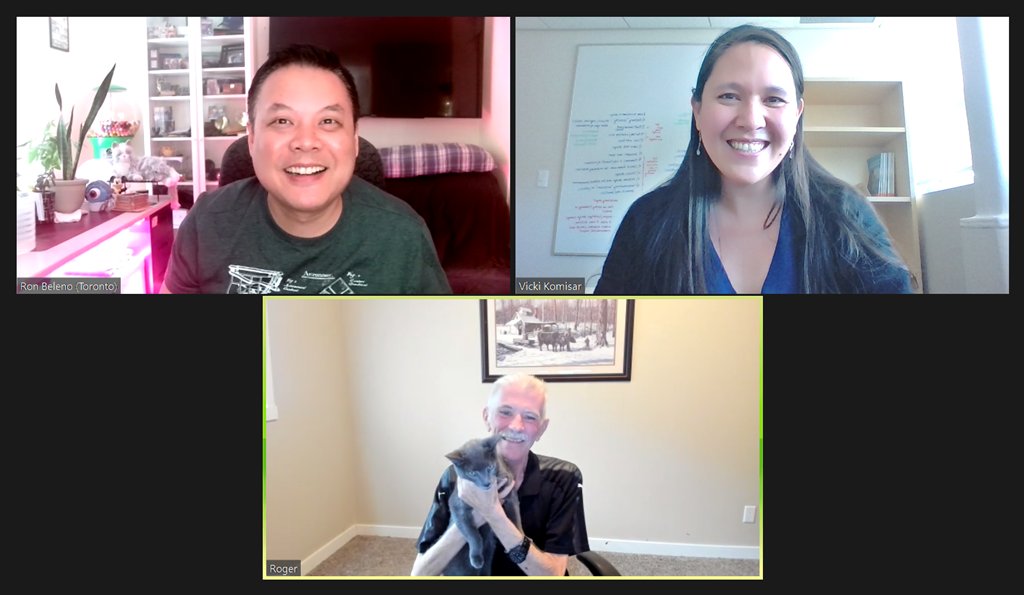Students in ENGR 423 Wearable Devices connect with community partners to uncover innovative solutions

Dr. Komisar joined by Ron Beleno (top left), Roger Marple and Bernie (the Wondercat) during a recent ENGR 423 class.
Adapting to life with dementia or caring for someone with dementia is full of challenges. From the outside looking in, most miss truly understanding the lived experience of those in these situations.
Addressing that lack of understanding was precisely the motivation behind one of the School of Engineering’s newest courses ENGR 423.
This past semester, ENGR 423 students interacted with Ron Beleno and Roger Marple. Beleno cared for his father, who had severe Alzheimer’s diseases, for nearly a decade while Marple was diagnosed with early-onset Alzheimer’s in his late 50s. He held a senior role in supply chain management with Alberta Health Services when he received his diagnosis.
The concept of the course is to provide students with the experience of uncovering wearable device design strategies through incorporating lived experience perspectives into their work.
Since developing the course in early 2021, Assistant Professor Vicki Komisar found Beleno and Marple as willing collaborators to participate and build ENGR 423. Beleno participated in the inaugural class in 2021, and Marple joined the course in 2022.
“The vision was to offer students the opportunity to engage meaningfully with community partners and incorporate their input seriously into wearable device design,” says Komisar. “In many cases engineers, especially junior engineers, avoid getting feedback from communities because it can be difficult and they fear saying the ‘wrong’ thing.”
Komisar explains that it was important for the course to create a safe environment for students to grow and learn how to engage constructively with different communities.
After the first iteration of the course in 2021, Komisar received funding from UBC’s Faculty of Applied Science EDI Fund to bring further lived experience perspectives into the classroom.
For Marple, the experience was eye-opening. “I have to say speaking to these students with their brilliant minds and how their thoughts evolve as they go through this process takes my breath away. I am in awe of them all. I feel honored to be a part of this.”
“Speaking with Ron and Roger was invaluable,” says third-year Mechanical Engineering student Catarina Rodriguez. “Hearing directly from them helped me better understand dementia and realize just how impactful assistive technology can be on people’s lives.” Rodriguez added that the course wouldn’t have been the same without their involvement.
The students considered a range of technologies, and while style was a factor, they also came to recognize the many challenges technology can help address.
According to Komisar that was only part of the course outcomes. “Beyond the technology, this course is focused on providing students with a sense of the many faces and values of dementia.”
The course sees students explore design and prototyping including textiles, hardware, software, data storage, miniaturization, wireless communication, power, environment, and fabrication. They also analyze wearable technologies and challenges of mass adoption.
“It is such a thrill, and inspirational to be involved in this whole process with these students.” says Beleno.